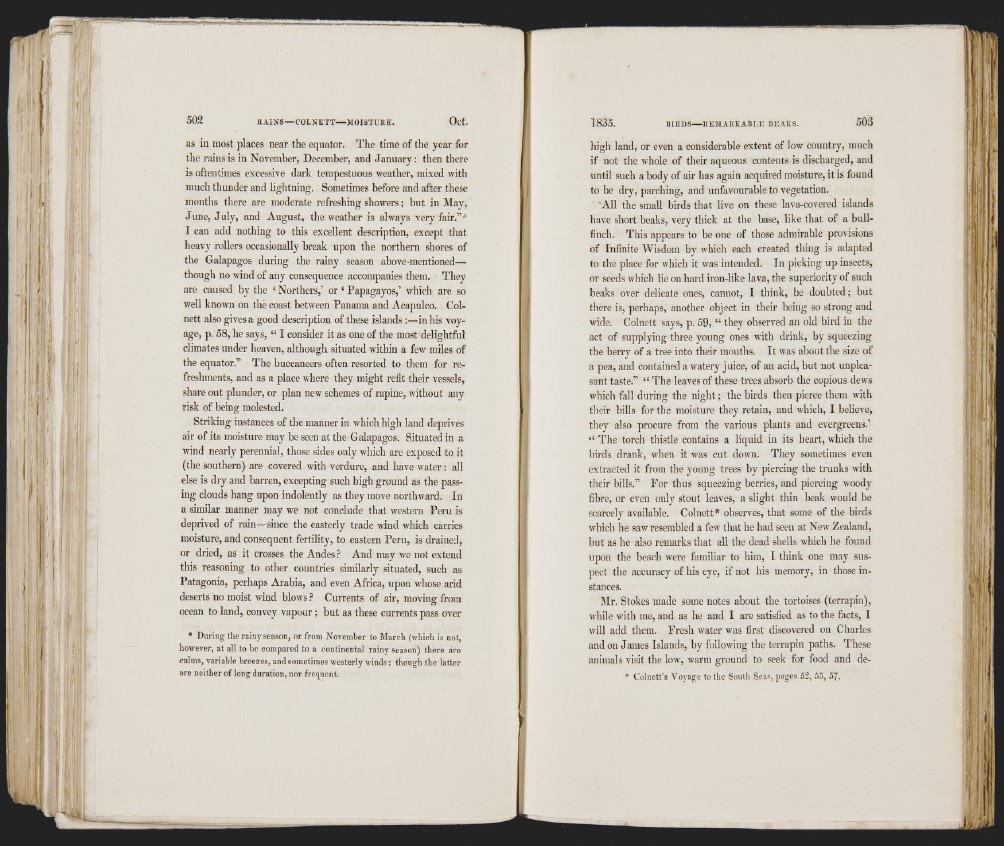
i #
M i
1 ;
iti
!j |*t
¡' i|;
Mil i
/•'
'M M i."
,■M' 1II1«1, 7.
\
:¡ [ . ; 'j'
ÌI *
f
í
! M
í T
I I
0' 0|: 0 íM
i f|
|) 0 : .i 1
0 ii' i
M l ' i
502 11 AIMS— COLNETT MOISTURE. Oct.
as in most places near the equator. The time of the year for
the rains is in November, December, and January : then there
is oftentimes excessive dark tempestuous weather, mixed with
much thunder and lightning. Sometimes before and after these
months there are moderate refreshing showers ; but in May,
June, July, and August, the weather is always very fair.” *'
I can add nothing to this excellent description, except that
heavy rollers occasionally break upon the northern shores of
the Galapagos during the rainy season above-mentioned—
though no wind of any consequence accompanies them. They
are caused by the ‘ Northers,’ or ‘ Papagayos,’ which are so
well known on thè coast between Panama and Acapulco. Colnett
also gives a good description of these islands ;—in his voy-
age, p. 58, he says, “ I consider it as one of the most delightful
climates under heaven, although situated within a few miles of
the equator.” The buccaneers often resorted to them for refreshments,
and as a place where they might refit their vessels,
share out plunder, or plan new schemes of rapine, without any
risk of being molested.
Striking instances of the manner in which high land deprives
air of its moisture may be seen at the Galapagos. Situated in a
wind nearly perennial, those sides only which are exposed to it
(the southern) are covered with verdure, and have water ; all
else is dry and barren, excepting such high ground as the passing
clouds hang upon indolently as they move northward. In
a similar manner may we not conclude that western Peru is
deprived of rain—since the easterly trade wind which carries
moisture, and consequent fertility, to eastern Peru, is drained,
or dried, as it crosses the Andes ? And may we not extend
this reasoning to other countries similarly situated, such as
Patagonia, perhaps Arabia, and even Africa, upon whose arid
deserts no moist wind blows.? Currents of air, moving from
ocean to land, convey vapour ; but as these currents pass over
• During the rainy season, or from November to March (which is not,
however, at all to he compared to a continental rainy season) there are
calms, variable breezes, and sometimes westerly winds ; though the latter
are neither of long duration, nor frequent.
1835. RIRDS REMARKABLE BEAKS. 503
high land, or even a considerable extent of low country, much
if not the whole of their aqueous contents is discharged, and
until such a body of air has again acquired moisture, it is found
to be dry, parching, and unfavourable to vegetation.
'All the small birds that live on these lava-covered islands
have short beaks, very thick at the base, like that of a bullfinch.
This appears to be one of those admirable provisions
of Infinite Wisdom by which each created thing is adapted
to the place for which it was intended. In picking up insects,
or seeds which lie on hard iron-like lava, the superiority of such
beaks over delicate ones, cannot, I think, be doubted; but
there is, perhaps, another object in their being so strong and
wide. Colnett says, p. 69, “ they observed an old bird in the
act of supplying three young ones with drink, by squeezing
the berry of a tree into their mouths. I t was about the size of
a pea, and contained a watery juice, of an acid, but not unpleasant
taste.” “ The leaves of these trees absorb the copious dews
which fall during the night; the birds then pierce them with
their bills for the moisture they retain, and which, I believe,
they also procure from the various plants and evergreens.’
“ The torch thistle contains a liquid in its heart, which the
birds drank, when it was cut down. They sometimes even
extracted it from the young trees by piercing the trunks with
their hills.” For thus squeezing berries, and piercing woody
fibre, or even only stout leaves, a slight thin beak would be
scarcely available. Colnett* observes, that some of the birds
which he saw resembled a few that he had seen at New Zealand,
but as he also remarks that all the dead shells which he found
upon the beach were familiar to him, I think one may suspect
the accuracy of his eye, if not his memory, in those instances.
Mr. Stokes made some notes about the tortoises (terrapin),
while with me, and as he and I are satisfied as to the facts, I
will add them. Fresh water was first discovered on Charles
and on James Islands, by following the terrapin paths. These
animals visit the low, warm ground to seek for food and de-
* Colnctt’s Voyage to the South Seas, pages 52, 55, 57.
Ml
k1
l Ì P ì
i f
ÍI
f't'l